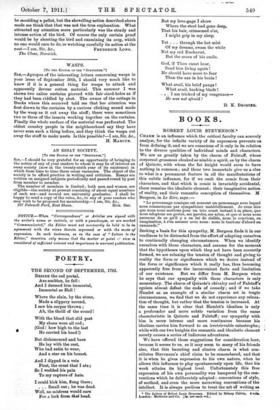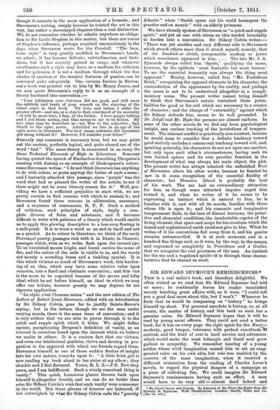BOOKS.
ROBERT LOUIS STEVENSON.* Climax is an influence which the critical faculty can scarcely analyse, for the infinite variety of its expression prevents us from defining it, and we are conscious of it only in its relation to the diverse qualities of individual minds and characters.
We are as greatly taken by the charm of Falstaff, whose corporeal grossness cloaked so nimble a spirit, as by the charm of Quixote, with whom the fat knight would seem to have nothing in common ; and these two immortals give us a clue to what is a permanent feature in all the manifestations of this subtle influence, for if we omit the comic from their
characters, and that which is comic is invariably accidental, there remains the idealistic element : their imaginative notion of reality, and their romantic conception of themselves. M Bergson, in Le lire, says " Le personnage comique est sonvent un personnage avec lequel nous commencons par sympathiser materielletnent. Je veux dire que nous nous mettons pour un tres court instant h set place, qua nous adoptons ses gestes, ses paroles, ses actes, et quo si nous nous amusons de ce qu'il y a en lui de risible, nous le convions, en imagination, a e'en amuser avec nous: nous le traitons d'abord en camarade."
Seeking a basis for this sympathy, M. Bergson finds it in our readiness to be distracted from the effort of adapting ourselves to continually changing circumstances. When we identify ourselves with these characters, and assume for the moment that the hypotheses upon which they act have been correctly formed, we are relaxing the tension of thought and giving to reality the form or significance which we desire instead of the form or significance which it really has, thus becoming apparently free from the inconvenient facts and limitation of our existence. But we differ from M. Bergson when he says that our sympathy with these characters is only momentary. The charm of Quixote's chivalry and of Falstaff's egoism almost defeat the ends of comedy; and if we take Hamlet as an example of a similar charm set in tragic circumstances, we find that we do not experience any relaxa- tion of thought, but rather that the tension is increased. At the same time it is clear that Hamlet's idealism is only a profounder and more subtle variation from the same characteristic in Quixote and Falstaff ; our sympathy with him is more intense and more continuous because his idealism carries him forward to an irretrievable catastrophe; while with our two knights the romantic and idealistic element merely causes a series of ludicrous adventures.
We have offered these suggestions for consideration here, because it seems to us, as it may seem to many of his friends also, that this haunting and elusive charm is what con- stitutes Stevenson's chief claim to be remembered, and that it is when he gives expression to his own nature, when he allows this influence to play spontaneously upon life, that his
work attains its highest level. Unfortunately this free
expression of his own personality was hampered by the con- ventions which he deliberately adopted : conventions of style, of method, and even the more narrowing conventions of the intellect. It is always perilous to treat the art of writing as
• The Letters of Robert Louis Stevenson. Edited by Sidney Colvin. 4 vols. London: Methuen and Co. pa net each vol.1
though it consists in the mere application of a formula ; and Stevenson's writing, simply because he treated the art in this way, has rather a stereotyped elegance than a real distinction. We do not remember whether he admits anywhere an obliga- tion to Sir Leslie Stephen in this matter, but there are traces of Stephen's influence, perhaps acquired unconsciously in the days when Stevenson wrote for the Cornhill. The lean, terse style" is very greatly modified in Stevenson's hands, we admit ; it has become delicate, valetudinarian, and fasti- dious, but it has scarcely gained in range, and 'whatever excellencies such a style may have, as a medium for criticism and for polemics, it is not a medium through which the fine shades of emotion or the massive features of passion can be conveyed quite adequately. One curious feature in Steven- son's work was pointed out to him by Mr. Henry James, and we may quote Stevenson's reply to it as an example of a theory hardened into convention
Your jubilation over Catriona did me good, and still more the subtlety and truth of your remark on the starving of the visual sense in that book. 'Tie true, and unless I make the greater effort—and am, as a step to that, convinced of its necessity —it will be more true, I fear, in the future. I hear people talking and I feel them acting, and that seems to me to be fiction. My two aims may be described as-1st, War to the adjective ; 2nd, Death to the optic nerve. Admitted we live in an age of the optic nerve in literature. For how 'many centuries did literature get along without it? However, I'll consider your letter."
Scarcely any comment is necessary here, but we may point out the curious, perfectly logical, and quite absurd use of the word:" feeL" The same theory is enunciated in an essay On Some Technical Elements of Style in Literature. Someone having quoted the speech of Enobarbus describing Cleopatra's meeting with Antony as an example of Shakespeare's colour- sense Stevenson writes : " I do not think literature has anything to do with colour, or poets anyway the better of such a sense ; and I instantly attacked this passage, since ` purple' was the word that had so pleased the writer of the article, to see if there might not be some literary reason for it." Well, pro- viding we have a sufficient prejudice to start with, we are pretty certain to find reasons with which to sustain it; and Stevenson found these reasons in alliteration, assonance, and a sequence of consonants, B, P, F. Such a method of criticism, such principles of style, imply a com- plete divorce of form and substance, and it becomes difficult to write with patience of a theory which would enable us to apply this glowing description to a hen-coop floating in a mill-pond. It is to treat a word as an end in itself and not as a symbol. As to colour in literature, we think of the early Provençal poetry, passages rich with it in Dante, in Chaucer, passages which, even as we write, flash upon the inward eye. To us burnished means bright, and burnt carries the sense of fire, and the colour of the sails is visible to us, and the words tot merely a sounding brass and a tinkling cymbal. It is this which vitiates so much of Stevenson's work, this harden- ing of an idea, which may have some relative value upon occasion, into a fixed and obstinate convention ; and this vice is the more to be regretted because of the severe and lofty ideal which he set before himself, an ideal to which we may offer our tribute, however greatly we may deplore its too rigorous application.
"Le style, c'est l'homme meme " and the new edition of The Letters of Robert Louis Stevenson, edited with an introduction by Sir Sidney Colvin, goes far to justify Sainte-Beuve's saying; but in the letters, though we see the man under varying moods, there is the same trace of convention; and it is only seldom that we are able to pierce through it to the quick and supple spirit which it hides. We might define egoism, paraphrasing Bergson's definition of vanity, as an interest in ourselves based upon the interest which we believe we excite in others. It is a curious fact that our virtues, and even our intellectual qualities, thrive and develop in pro- portion to the approval with which our friends regard them. Stevenson himself, in one of those sudden flashes of insight into his own nature, remarks upon it: "A little Irish girl is now reading my book aloud to her sister at my elbow; they chuckle and I feel flattered. Youri, R. L. S.—P.S. Now they yawn, and I am indifferent Such a wisely conceived thing is vanity." This quick, humorous glance thrown back upon 'himself is altogether lovable, and we can do no better than echo Sir Sidney Colvin's wish that such vanity were commoner ,in the world. But these gleams of humour are balanced, if not outweighed, by what Sir Sidney Colvin calls the "gravely didactic" when " Smith opens out his cauld harangues On practice and on morals" with an elderly primness.
We have already spoken of Stevenson as "a quick and supple spirit," and yet as one with whom an idea tended invariably to harden into a convention. Sir Sidney Colvin writes :— " There was yet another and very different side to Stevenson which struck others more than it struck myself, namely, that of the freakish or elvish, irresponsible madcap or jester which sometimes appeared in him. . . . The late Mr. J. A. Symonds always called him Sprite,' qualifying the name, however, by the epithets 'most fantastic but most human.' To me the essential humanity was always the thing. most apparent." Henley, however, called him " Mr. Fastidious Brisk," recognizing the opposed elements in his character, the contradiction of the appearance by the reality, and perhaps the name is not to be understood altogether in a compli- mentary sense. The present writer cannot bring himself to think that Stevenson's nature contained those poten, tialities for good or for evil which are necessary to a creator of character; and the charge of " externality," against which Sir Sidney defends him, seems to be well grounded. In br. Jekyll and Mr. Hyde the persons are almost uniform. In none of the other novels do we find any keen psychological insight, any curious tracking of the involutions of tempera- ment. The internal conflict is practically non-existent, becaise he would seem to consider that a definite tendency toward good entirely excludes a concurrent tendency toward evil, and, speaking generally, his characters do not act upon one another, but only upon each other's circumstances, having each its own limited sphere and its own peculiar function in the development of what was always his main object, the plot. The present writer has always admired the unfinished Weir of Hermiston above his other works, because he fancied he saw in it some recognition of the essential fluidity of character; but Treasure Island is probably the best of his work. The sea had an extraordinary attraction for him, as though some inherited impulse urged him toward it, and when he writes of it he seems to be expressing an instinct which is natural to him, he is familiar with it, and with all its moods, familiar with those whose life is upon it; and his romantic and imaginative temperament finds, in the lure of distant horizons, the primi- tive and elemental conditions, the incalculable caprice of the living element, that space and scope for his creations which the tamed and sophisticated earth could not give to him. When he writes of it his conventions fall away from it, and his genius remains untrammelled. It is at such momenta and in a hundred fine things said, as it were, by the way, in the essays, and expressed so completely in Providence and a Guitar, that we recognize the real greatness of the man. An instinct for the sea and a vagabond spirit—it is through these charac- teristics that be charms us moat.































































 Previous page
Previous page